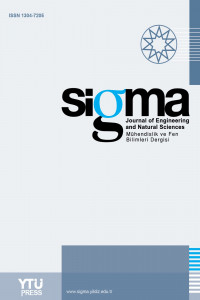Research Article
AN MS EXCEL TOOL FOR PARAMETER ESTIMATION BY MULTIVARIATE NONLINEAR REGRESSION IN ENVIRONMENTAL ENGINEERING EDUCATION
Abstract
This paper presents the implementation of an MS Excel tool for parameter optimization in environmental engineering education. Visual Basic for Applications v7.0 were used for implementation of the program. A number of test cases were also provided to test the performance of the tool including the fields of air pollution control, water treatment, and anaerobic treatment. For each test case, calculated coefficients of determination were 0.98 and above. Results suggested that the MS Excel tool produces satisfactorily fast and reliable results, and can be used confidently for optimization works in environmental studies.
References
- [1] Li X., Huang Z., (2017) An inverted classroom approach to educate MATLAB in chemical process control, Educ. Chem. Eng. 19(1), 1-12.
- [2] Dehghanimohammadabadi M., Keyser T.K., (2017) Intellegent simulation: Integration of SIMIO and MATLAB to deploy decision support systems to simulation environment, Simul. Modell. Pract. Theory 71(45), 45-60.
- [3] Ku H., Fulcher R., (2012) Using computer software packages to enhance the teaching in Engineering Management Science – Part 2: Programming Techniques, Comput. Appl. Eng. Educ. 20(1), 114-123.
- [4] Orosa J.A., Oliveira A.C., (2012) Improvement in quality control for applications used by marine engineers, Comput. Appl. Eng. Educ. 20(1), 187-192.
- [5] Norton T., Tiwari B., (2013) Aiding the understanding of novel freezing technology through numerical modelling with visual basic for applications (VBA), Comput. Appl. Eng. Educ. 21(3), 530-538.
- [6] Niazkar M., Afzali S.H., (2016) Streamline performance of Excel in stewise implementation of numerical solutions, Comput. Appl. Eng. Educ. 24(4), 555-566.
- [7] Orosa Garcia J.A., (2011) Programming Languages for Marine Engineers, Comput. Appl. Eng. Educ. 19(3), 591-597.
- [8] Fernandes S., Orosa J.A., Galan J.J., (2012) A new methodology to teach numerical methods with MS Excel, J. Mar. Res. 9(2), 29-32.
- [9] Leon S.B., Ulfig R., Blanchard J., (1998) Teaching the numerical solution of ordinary differential equations using Excel 5.0, Comput. Appl. Eng. Educ. 4(2), 117-125.
- [10] Ferreira E.C., Salced, R., (2001) Can spreadhseet solvers solve demanding optimization problems?, Comput. Appl. Eng. Educ. 9(1), 49-56.
- [11] Rivas A., Gomez-Acebo T., Ramos J.C., (2006) The application of spreadsheets to the analysis and optimization of systems and processes in the teaching of hydraulic and thermal engineering, Comput. Appl. Eng. Educ. 14(4): 256-268.
- [12] Demir S., Yetilmezsoy K., Manav N., (2008) Development of a modified Hardy-Cross algorithm for time-dependent simulations of water distribution networks, Fresen. Environ. Bull. 17(8a), 1045-1053.
- [13] Orosa Garcia J.A., (2009) Programming languages for marine engineers, Comput. Appl. Eng. Educ. 19(3), 591-597.
- [14] Orosa J.A., Oliveira A.C., (2009) Improvement in Quality control for applications used by marine engineers, Comput. Appl. Eng. Educ. 20(1), 187-192.
- [15] Demir S., Saral A., Ertürk F., Kuzu L., (2010) Combined use of principal component analysis (PCA) and chemical mass balance (CMB) for source identification and source apportionment in air pollution modeling studies, Water Air Soil Pollut. 212, 429-439.
- [16] Demir S., Saral A., (2011) A new modification to the chemical mass balance receptor model for volatile organic compound source apportionment, Clean – Soil Air Water, 39(10), 891-899.
- [17] Fernandez S., Orosa J.A., Galan J.J., (2012) A new methodology to teach numerical methods with MS Excel, Journal of Maritime Research IX(2), 29-32.
- [18] Chebbi R., (2014) Chemical reactors sequencing. Comput. Appl. Eng. Educ. 22(2), 195-199.
- [19] Niazkar M., Afzali S.H., (2017) Analysis of water distribution networks using matlab and Excel spreadsheet: h-based methods, Comput. Appl. Eng. Educ. 25(1), 129-141.
- [20] Demir S., (2014) A practical model for estimating pressure drop in cyclone separators: An experimental study, Powder Technol. 268, 329-338.
- [21] Demir S., Karadeniz A., Manav-Demir N., (2016) Artificial neural network simulation of cyclone pressure drop: Selection of the best activation function, Pol. J. Environ. Stud. 25(5), 1891-1899.
- [22] Demir S., Karadeniz A., Manav-Demir N., (2016) Using steepness coefficient to improve artificial neural network performance for environmental modeling, Pol. J. Environ. Stud. 25(4), 1467-1477.
- [23] Painmanakul P., Wachirasak J., Jamnongwong M., Hebrard G., (2009) Theoretical prediction of volumetric mass transfer coefficient (kLa) for designing an aeration tank, Engineering Journal 13(3), 13-28.
- [24] Esposito G., Frunzo L., Liotta F., Panico A., Pirozzi F., (2012) Bio-methane potential tests to measure the biogas production from the digestion and co-digestion of complex organic substrates, The Open Environmental Engineering Journal 5, 1-8.
- [25] Donoso-Bravo A., Perez-Elvira S.I., Fdz-Polanco F., (2010) Application of simplified models for anaerobic biodegradability tests. Evaluation of pre-treatment processes, Chem. Eng. J. 160(2), 607-614.
- [26] Montecchio D., Gallipoli A., Gianico A., Mininni G., Pagliaccia P., Braguglia C.M., (2016) Biomethane potantial of food waste: Modeling the effects of mild thermal pretreatment and digestion temperature, Environ. Technol. DOI: 10.1080/09593330.2016.1233293.
There are 26 citations in total.
Details
| Primary Language | English |
|---|---|
| Journal Section | Research Articles |
| Authors | |
| Publication Date | June 1, 2017 |
| Submission Date | February 13, 2017 |
| Published in Issue | Year 2017 Volume: 35 Issue: 2 |
IMPORTANT NOTE: JOURNAL SUBMISSION LINK https://eds.yildiz.edu.tr/sigma/

